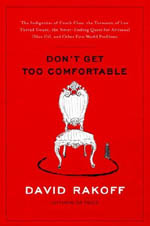In it for the Long Haul?
Two seemingly unrelated articles in the New York Times caught my attention today. In the first, "Short on Drivers, Truckers Offer Perks," Ian Urbina indicates that long-haul trucking is experiencing a shortage of workers due to the retirement of older truckers and relatively lucrative wages in "construction and other blue-collar jobs." In the second, an editorial entitled "Tortured Logic," four-year Army veteran Anthony Lagouranis discusses how the ambiguity of orders for prisoner interrogations leads to court martial charges for soldiers. How are these two items related? Through their exploration of job expectations and masculinity.
Throughout "Short on Drivers," Urbina maintains that long-haul trucking is an enterprise largely undertaken by men. Even so, he notes that its long hour
 s, geographical displacement, and stress often cause drivers to burn out. He quotes from a trucker of eight years, Nasser Adams, who says, "I missed my son's birth, first steps and kindergarten graduation. And I'm better off than most drivers who don't get home every weekend like I do." That's right - though truckers are usually men, they also have personal investments, including family and friends. And, for all but the most misanthropic of men, the benefits of a $19-an-hour paycheck must come at some personal cost.
s, geographical displacement, and stress often cause drivers to burn out. He quotes from a trucker of eight years, Nasser Adams, who says, "I missed my son's birth, first steps and kindergarten graduation. And I'm better off than most drivers who don't get home every weekend like I do." That's right - though truckers are usually men, they also have personal investments, including family and friends. And, for all but the most misanthropic of men, the benefits of a $19-an-hour paycheck must come at some personal cost.So, how to fix the short-fall? The Truckload Carriers Association indicates that it is working with Congreso de Latinos Unidos to encourage more Hispanic recruits. While this initiative does not seem to address the industry's problem with rootlessness, their second plan - restructuring routes to include more husband and wife driving teams - does. One hopes that the trucking industry's willingness to revalue the the social and familial needs of its workers (men and women of any ethnicity) will outlast the economic necessity to do so.
In Lagouranis's editorial, he discusses the impending court martials of Sgts. Santos Cardona and Michael Smith both of whom used their dogs to intimidate Iraqi prisoners during interrogations at Abu Ghraib prison. Lag
 ouranis confirms that he, too, used dogs "following orders that [he] believed were legal" and affirms "I also deserve to be prosecuted." (He notes that, while the dogs were muzzled and restrained by a handler, prisoners were blindfolded and couldn't have known this.) Though Lagournais willingly acknowledges his wrongdoing (and, one hopes, the ability of malicious individuals to act without order), he also details the chain of command involved in securing these actions. Further, he goes on to name higher-ranking officers who, though culpable themselves, let those in the lower ranks take the punishment.
ouranis confirms that he, too, used dogs "following orders that [he] believed were legal" and affirms "I also deserve to be prosecuted." (He notes that, while the dogs were muzzled and restrained by a handler, prisoners were blindfolded and couldn't have known this.) Though Lagournais willingly acknowledges his wrongdoing (and, one hopes, the ability of malicious individuals to act without order), he also details the chain of command involved in securing these actions. Further, he goes on to name higher-ranking officers who, though culpable themselves, let those in the lower ranks take the punishment.While the main issue here is certainly the abuse of prisoners and transgression of Geneva Convention policies, a corollary issue lies in honor as well as, appropriately enough, workplace expectations. Many soldiers going to war do so because they honor their country and its ideals; many of them also need the money. In many ways, serving one's country involves "being a Man," providing for one's family or nation while sacrificing one's life (regardless of sex). Even so, the maintenance of ambiguous interrogation policies devalues the service of men and women and prosecutes them for following the very orders they are not allowed to question. In a time of "terror," how are we to expect respect from those we abuse, be it our "enemies" or our own service personnel?
In closing, while society has routinely encouraged men to sacrifice themselves in jobs situations or for military service, one hopes that they are able value their own individual lives as well. Conversely, one prays that women entering either the trucking industry or the military will garner the respect they may earn and receive any protection they may need. Here's to the long haul - may it not be so long, cruel, or lonely as we might think.





















